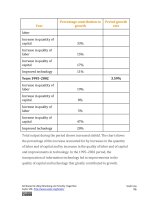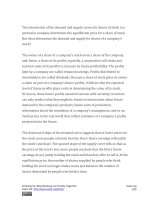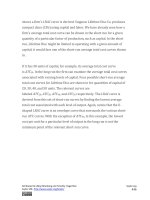Authors libby rittenberg 880
Bạn đang xem bản rút gọn của tài liệu. Xem và tải ngay bản đầy đủ của tài liệu tại đây (411.42 KB, 1 trang )
applied with greater consideration of its implications for the
competitiveness of U.S. businesses against Asian, European, and other
firms. Whether or not antitrust laws among nations will be made more
compatible with each other is an issue for the future.
We saw that there are many different schools of thought concerning
regulation. One group believes that regulation serves the public interest.
Another believes that much current regulation protects regulated firms
from competitive market forces and that the regulators are captured by
the firms they are supposed to regulate. Yet another group points out that
the regulators may do little more than serve their own interests, which
include increasing the bureaucratic reach of their agencies.
Finally, the chapter looked at the complex issues surrounding consumer
protection regulations. Consumer protection legislation has costs, borne by
consumers and taxpayers. Economists are not in agreement concerning
which, if any, consumer protection regulations are warranted. They do
agree, however, that market incentives ought to be used when appropriate
and that the most cost-effective policies should be pursued.
CONCEPT PROBLEMS
1. Apex Manufacturing charges Zenith Manufacturing with predatory
pricing (that is, selling below cost). What do you think the antitrust
authorities will want to consider before they determine whether to
prosecute Zenith for unfair practices in restraint of trade?
2. Some states require firms to close on Sunday. What types of firms
support these laws? Why? What types of firms do not support these
laws? Why?
Attributed to Libby Rittenberg and Timothy Tregarthen
Saylor URL: />
Saylor.org
880









